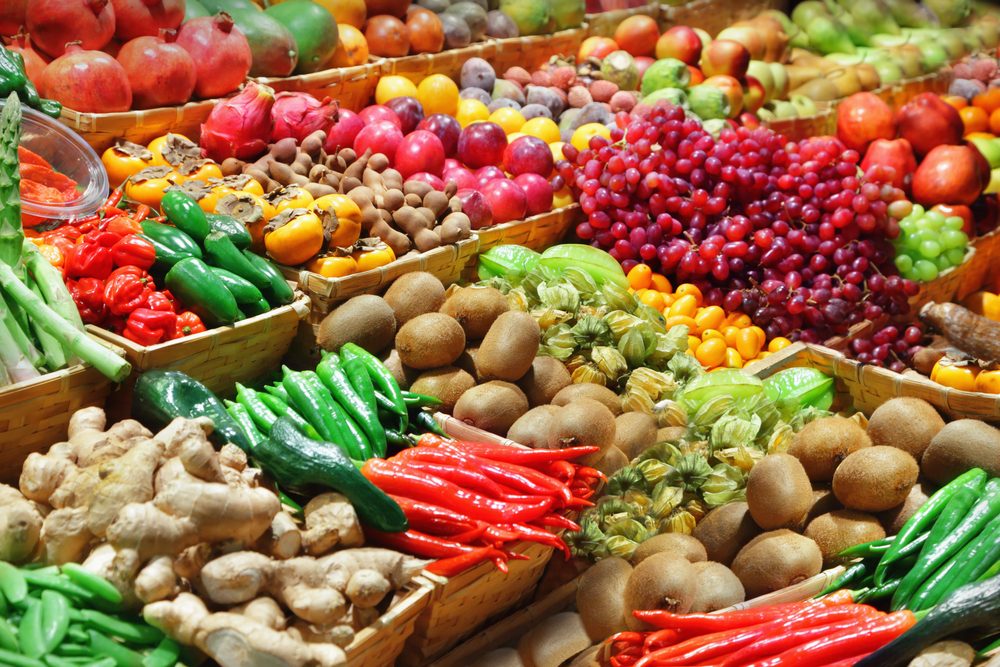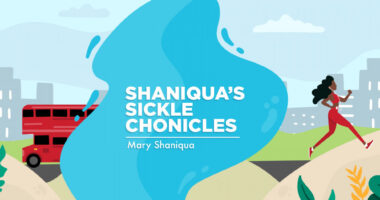To Me, Vegan Diets Aren’t Ideal for People With Sickle Cell Disease

Adisa/Shutterstock
I can barely watch five minutes of television before an advertisement for a new vegan food pops up. They’re even more frequent on social media, as every other photo I see seems to be sponsored content for mock meats, protein powders, or a vegan version of a dairy product.
Don’t get me wrong, I’m not entirely averse to vegan diets. I followed a vegan diet for three years, after all! I felt fantastic for over two years before my health began to go downhill and I had to quit — very reluctantly, I should add. There’s a certain pride one feels when excluding animal foods from the diet when one is a part of the vegan community.
If you’ve followed popular proponents of veganism, you’ll find that many end up with similar stories as mine. It may start well, they might feel terrific, and they can’t help but tell everyone who cares (or doesn’t) about this new diet, and why others need to try it ASAP.
They might feel fantastic for a few years or even longer, and then all of the health problems might begin to kick in, such as vitamin and mineral deficiencies, kidney stones, hair loss, brain fog, extreme fatigue, and more. That said, it’s not doom and gloom for everyone, as some people claim to thrive on a whole-food, plant-based vegan diet.
A whole-food, plant-based vegan diet focuses on eating whole, unprocessed foods. It includes whole grains, starchy and leafy vegetables, beans, lentils, fruits, nuts, and seeds, with no animal product or byproducts.
The Academy of Nutrition and Dietetics, formerly known as the American Dietetic Association, stated that a properly planned vegan diet can be healthy for people of all ages. Apart from the fact that a properly planned vegan diet is challenging to achieve, even for a trained health professional, much less the average person with minimal nutritional knowledge, health professionals don’t specify if it is also healthy for people with underlying conditions.
In addition to the pain and the inflammation that come with sickle cell disease, it also places people at a high risk of malnutrition. Research suggests that people with sickle cell disease have significantly higher caloric, protein, vitamin, and mineral requirements than healthy individuals.
The average person can just about meet the recommended protein requirements when eating a vegan diet. If they stick to eating whole foods, most of the protein in their diet likely will come from legumes, or beans and lentils.
I know the discomfort and pain that comes with eating legumes frequently — it is not fun. Most (honest) people can attest to that.
Besides, legumes are low-calorie and keep you feeling full for long periods. If you have a small appetite, which some people with sickle cell do, especially during a crisis, it is unlikely you’ll be able to eat enough calories and protein to keep you healthy.
Eating a whole foods vegan diet also means you’ll naturally eat very high quantities of fiber. While good for you, excess fiber also drastically reduces the number of calories you can eat, which may eventually cause weight loss. If weight loss is unintended, that could be problematic.
Moreover, you will need to eat plenty of vegetables to get nutrients readily available from small quantities of animal products. Some vegetables and legumes are rich in compounds called phytates and oxalates. In small quantities, phytates have health benefits. In large amounts, however, they can be detrimental by preventing the body from absorbing crucial minerals such as zinc, iron, and calcium. Oxalates can cause kidney stones in susceptible people.
Many of these adverse health effects occur in otherwise healthy people. I dread thinking about what could happen in someone with sickle cell disease.
Everyone is different, and my fears could very well be unfounded. If this is a lifestyle you’ve chosen and you’re thriving, keep it going. For me, a plant-based, Mediterranean-style diet is a much better and balanced approach.
***
Somi Igbene, PhD, ANutr, is a registered associate nutritionist and biomedical scientist in London. She has worked with several medical communications agencies in London and has helped various clients improve their health with diet. She writes about caregiving for her toddler son as he thrives with sickle cell.
***
Note: Sickle Cell Disease News is strictly a news and information website about the disease. It does not provide medical advice, diagnosis, or treatment. This content is not intended to be a substitute for professional medical advice, diagnosis, or treatment. Always seek the advice of your physician or other qualified health provider with any questions you may have regarding a medical condition. Never disregard professional medical advice or delay in seeking it because of something you have read on this website. The opinions expressed in this column are not those of Sickle Cell Disease News or its parent company, Bionews, and are intended to spark discussion about issues pertaining to sickle cell disease.








Anna M Johnson
I enjoy reading your perspective on nutrition and Sickle Cell. I am working on expanding awareness of Sickle Cell Disease in South Carolina, USA and would like to chat with you sometime!
Anna Johnson, MHSA, RD, LD
Joy vongs
I find that adding raw fruits and vegetables provide tons of nutrients and benefits for well being and has worked for me with sickle cell.
Tracey
Whilst I do not suffer from Sickle Cell disease, I discovered in my late teens I was sickle trait, and neither of my parents carry it. Recently, now I am older I gave up meat as I knew it was a direct link to my hormone imbalances (as most meats contain Estrogen, testosterone, steroids, antibiotics, chloride, lacks B-12 etc.). Once I gave up the meat I realized that a smell I always carried after going to toilet went, especially first thing in the morning when it was at it's worst. Headaches went, fatigue went (and I was struggling to wake up in the day), pains in sides went, digestion has improved and hormones settled down. Then just this year I found out Sickle Cell trait carriers are prone to Kidney disease troubles, due to low oxygen levels in the kidneys, which caused filtration rate issues and everything that even bothered me most of my life, made sense. Thus, therefore, for me, whilst I am not mentally a natural vegan, my body requires me to be so. It was not biologically built for average meat consumption at all, even taking sauce that has been cooked in meat poses some immediate issues.
As for the issues some fruits and vegetables can pose on the Kidneys, everything needs moderation. Do not blend bananas, avocados high in Potassium, just eat one a day. Soak all beans for at least 2 days to get out the Phytic acid. Cook Spinach, kales C Greens to get out the oxalates, don't mixed incorrect fruits and vegetables together. Furthermore, wake up first thing to drink hot lemon and at night drink Cider Vinegar, these prevent kidney stones and washes out the renal system, and consume other fruit and veg that are very Kidney Friendly. That said never had any issues with fruit and veg. Take your Black Seed oils high in Omega 3 and B-12 nutritional yeast. Onions, garlic, tumeric, ginger is great for inflammation too. I'd thank God I never smoked, drank or did drugs, otherwise I don't think I would be here at all.
S Bailey
I embarked on a plant based diet for ethical reasons and transitioned to whole foods plant based. I noted significant improvement in both my physical and mental health.
Stomach cramps and pain, sore breasts and water retention stopped. I noticed that the brain fog that I had suffered so long that I had come to think this was my normal lifted. Joint pain subsided and I was less likely to feel fatigued.
I don’t think is is a matter of plant based diets being detrimental. Reverting back to eating an animal based diet is not necessarily the solution if health is the goal and you are still eating rubbish. The correct thing to do for someone managing a medical condition would be to tailor your diet to your specific needs. That means that as someone with sickle cell you can not necessarily afford to take your lead of adverts and medical professionals should be dissuading you from doing so since all adverts sell you processed food which we already know is not ideal. Why would that be your go to IF health and healing is your goal?. Why not look at whole foods. If caloric intake is higher than average. Don’t follow the advice of You Tubers who are providing advice to help people lose weight. Follow advice specific your your needs. Eat more avocados nuts and seeds because you can. These will EASILY provide you with the calories you need for a small amount of effort. You don’t even have to cook them. If it is still as struggle throw them in to a blender and drink them with the water that you must also consume a lot of to stay healthy. It will be easier to digest. Use herbs and spices in everything you consume to get the highly concentrated micronutrients they provide. Don’t just use parsley as a garnish, think differently about foods. Find out the best sources of nutrients that are more challenging but NOT IMPOSSIBLE to find on a vegan diet and incorporate those in to you diet as much as you can. (Don’t assume you are even getting these on a meat based diet you certainly are not getting much Vitamin C or K which people with sickle cell can not afford to run low on at all. Soak your beans cook your kale and spinach to improve absorption. Read widely about the different ways of consuming a Whole Foods plant based diet. Some will have greens as their main food source. Probably not right for you if you have a small appetite! Others will have starches or starches and legumes at the base. Some will prioritise fruit and more. Some only have raw or lightly cooked foods. You can not possibly write off plant based diets for people with sickle cell when there are so many variables (millions of different plants that can be used for food) and there is only anecdotal evidence to prove otherwise.
There is nothing in a portion of flesh or milk that the body needs that can not be acquired from a plant based source. The primary limiting factor is education on how to acquire this and how to incorporate them into the diet. B12 can be supplemented just as it is supplemented to the animals that are used for food since it is produced by bacteria.
I have found that the majority of people online who struggle with it have not allowed enough time for their bodies to adjust. There will be more bloating and flatuence if you are transitioning for a meat heavy diet because your gut microbiome is changing. The lower the starting point when it comes to vegetable and legume intake the bigger the struggle. You are taking in more cellulose and the beneficial bacterial in the gut are beginning to finally thrive. Over time this will subside. It will be made easier with better food preparation of legumes. Eating SPROUTED grains and legumes of extended soaking should alleviate these symptoms for most people. Sprouted seed grains and legumes are also easier for the body to digest.
Pooping more often should not be pathologised if the stools are healthy. Why would you want to keep inside the body what the body is rightly trying to eliminate? Clearing the gut so that more efficient absorption of essential nutrients can take place. It may seem inconvenient but health goal are often inconvenient which is why so many of us remain unhealthy in the first place. We just don’t want to deal with it.
I think rather than finding ways to say no we should look into educating people about how they can make it work IF they want to opt for a plant-based diet.
Let’s not forget people with sickle cell may also be dealing with other health conditions such as cardiovascular disease, diabetes/pre-diabetes, kidney disease etc. All these conditions can be improved with a whole food plant based diet.
Binta
Thanks for sharing your perspective. I have been plantbased for more than 10 years and still thriving! These last years, I have changed my nutrition quite a lot, focusing on wholefoods and eating a diverse variety of plants. I can really recommend the book Fiber Fueled by Will Bulsiewicz, MD.
Our experience with sickle cell and veganism:
My son was diagnosed with sickle cell disease just after birth - to our shock - and we didn't have anyone in our families who had it. So, much was new to us and I immediately started researching a lot, also about the links of nutrition and scd. His specialist was very much against my son following a vegan diet and even send us to a nutritionist when he was a toddler. Once I explained her everything I am preparing for him, she was not worried at all and told me to continue. So, I can report that he is almost 5 years old, never had a crisis and is thriving ! I breastfed him for two full years - he started daycare at 5 months, was the least sick in his group. Sometimes he would come down with something, never very bad, literally other non scd kids were more sick and most of them not breastfed beyond a couple of months. Of course, it is not only nutrition, I do think he has a light form, but there is value in a plantbased diet and a healthy lifestyle. From young on, my son is used to always carry a bottle, drink abundantly water and now he is also doing sports. I tell him not to exhaust himself and to drink a lot. I do think that a healthy, balanced and well planned plantbased diet offers many advantages. When you look at how arteries can get clogged from meat consumption and all the other problematic ingredients in meat, I do think a plantbased diet offers more advantages for helping with a healthy bloodflow and also a healthy gut which in turn helps for the immune system to be strong.
I also read your article on antibiotics, and my son is taking oracillin since he's a baby and his doctor confirmed that it is very targeted to the pneumococcal bacteria, so I didn't go against his advice, although I worry sometimes. It seems to be fine, my son seems to have built a great immune system - he was also born naturally, vaginal birth and then bf from start, never drank any formula - I am sure all that helped. It's just anecdotal of course, but from all my friends' kids and his kindergarden mates, he is the least sick child with so much energy (even compared to his siblings). Sometimes, I notice his eyes become a bit more yellow when he is tired, but that is the only thing I notice. Sometimes, when we come home from cold weather, he can have pain in his fingers, but that's it.
Thank you very much for your column, I will definitely continue coming here !